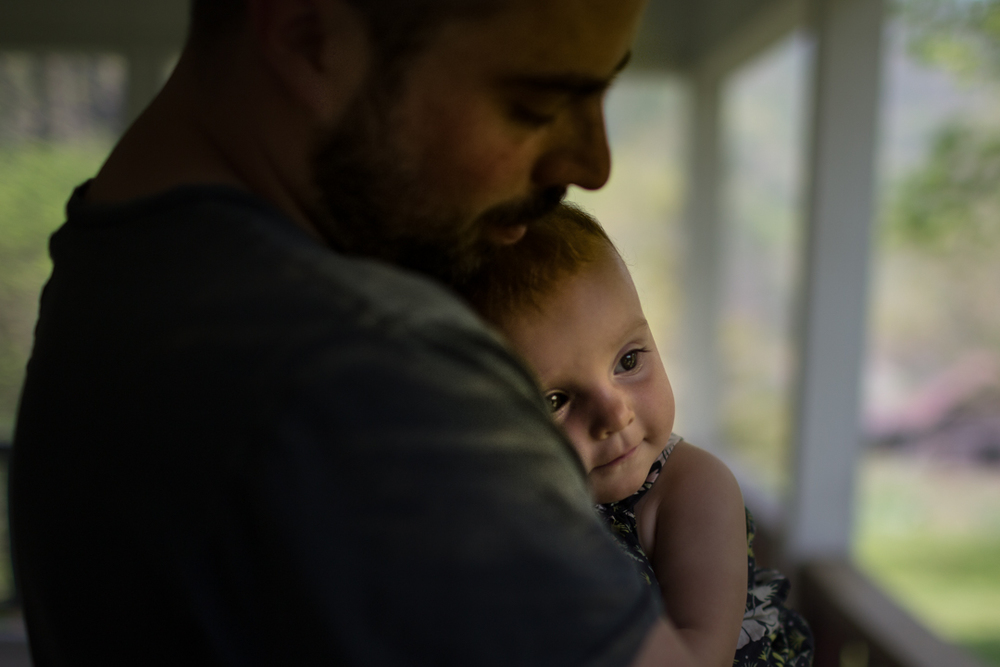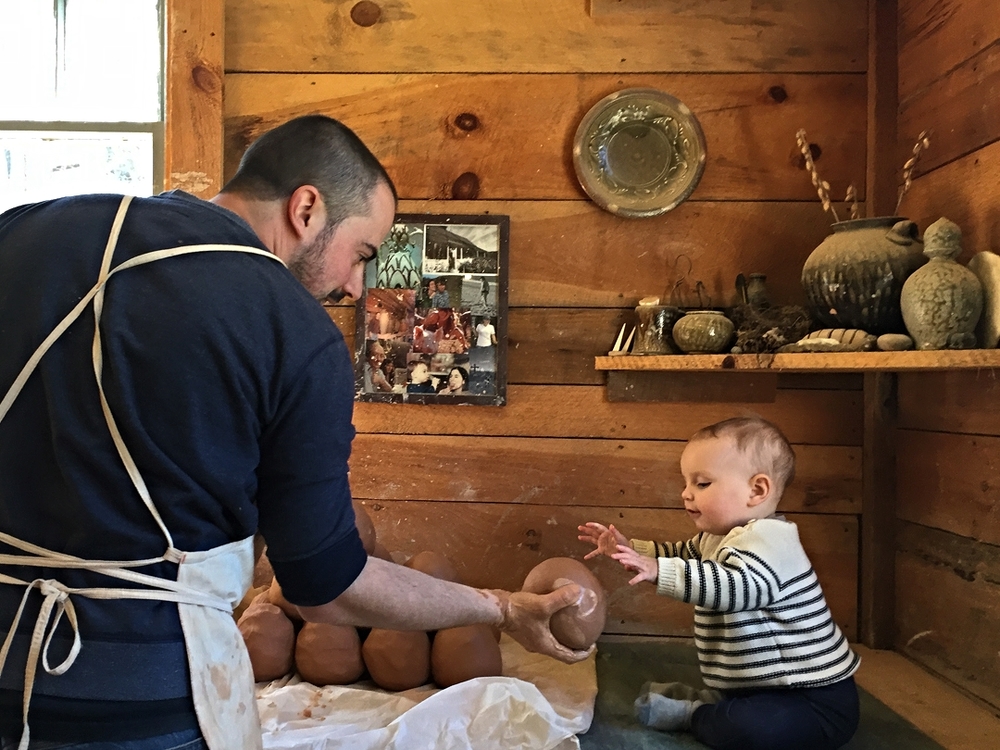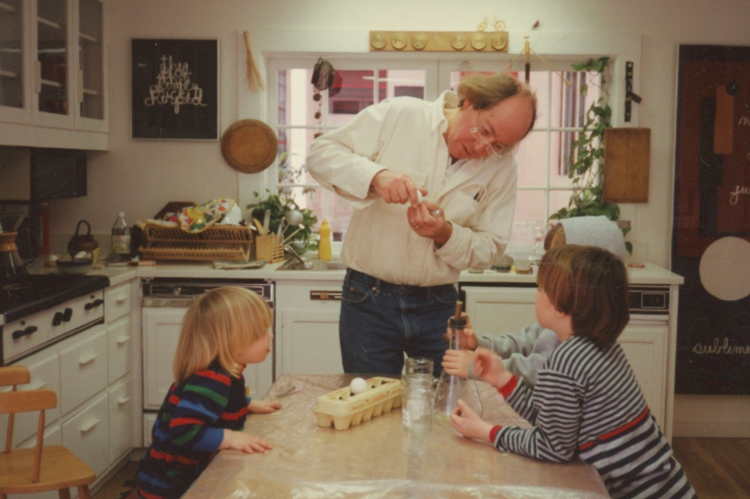
C: Happy first Father’s Day, Alex! What’s your favorite part about being a father so far?
A: [Without pause] The look on her face when I walk through the door when I come home from work. It’s amazing to feel this little being clinging to you so tightly, her little arms wrapping around me. It never gets old.
C: Is your experience with fatherhood as you expected it to be? Or did you have some preconceived notions about fatherhood that have been challenged?
A: I feel like I went into it with a complete beginner’s mind. I used to think that I would have every duck in a row before having kids; that everything in my life would be completely organized. But even after doing all the work [and by “the work”, he means “many years of therapy”] to understand my own father and our relationship early on in my life, when I was finally thrust into fatherhood it was just all so unexpected and so new that I didn’t even put to use all the things I thought I’d learned. Or maybe I have…
C: Do you mean you expected to approach it more methodically?
A: Exactly—I thought that being a father would be this perfect, clinical thing that you could do without ever messing up, because you’d be “ready”…
C: Like you’d have a parenting philosophy that you never sway from?
A: Yeah, and that hasn’t been the case.
C: If you had any “philosophy” about parenting at all, what would it be?
A: Just try to be present. That’s all. Even when it’s really difficult, keep working towards that. Try and separate the work when possible. And prioritize the important stuff.
C: What’s your most treasured memory you’ve made with Vita so far?
A: Well, it’s been nice feeling more independent with her, now that she can go longer stretches without needing you. I love just sitting with her and having dinner at the bar at All Soul’s – she interacts with everybody and gives everyone kisses. It’s been nice to have that one-on-one father-daughter time - it’s really starting to blossom in this sweet way.
C: Do you have a memory of your dad that’s indicative of the type of dad he was when you were little?
A: My dad built us a lot of toys in his workshop. We’d go to the workshop with him and watch him build things just for us. He was always making beautiful things for my mother or for his children….without them being tied into his business. It was just the way he lived his life. He didn’t have the same pressures of running a business the way I do, but still, I’d like to find time to make things just for other people’s pleasure, as gifts…
C: What did you think about your dad’s work when you were a teenager?
A: It’s hard to understand why someone wants to spend time doing something other than being with you. So for a long time it was difficult to understand why his art was important--because it didn’t have any direct impact on my life and at times it felt like the thing that would pull him away from us. But…about 10 years ago we took a trip to Greece. We were in Delphi, which is one of his favorite places in the world. And we were sitting up in the mountains in a little café and he told me this story of how he was in the subway fixing the bells in the Boston T , which need regular maintenance - he always had to go late at night, right when the last train left so he could climb down onto the tracks and work on the bells that hung in the middle...and there was this really intimidating man on the opposite platform, pacing back and forth, and my father was getting more and more nervous because he was alone with this guy - and he was just not the type of guy my dad interfaces with on a regular basis...you know, lots of leather. And the guy finally just stopped in front of him and said, “Are you Paul?” And my father was taken aback and said, “Yes, I am.” And the guy said, “You’re Paul Matisse? Well I just want to say thank you for building these bells. They’re just one of the most beautiful things I’ve ever seen and I enjoy using them every day.” Hearing him tell that story really changed how I saw him and his approach to his work - it crystallized very quickly why people make art and how it really does touch so many other people. As a child, art always seemed like a very egotistical, self-centered, indulgent pursuit.

C: I have this perhaps naive hope that if Vita is invited very early on to partake in your work in some way that she won’t resent you as much for being so absorbed in it...
A: Bill, my grandfather on my mother’s side, was an anthropologist. He had a little desk in his office and when he was writing his kids would come down to the barn – his office was in the top of the barn – and he would hear them with their snowboots trudging up to his office [They lived in northern Vermont, after all, where it snows 9 months of the year]. And they knew that they could come in and grab a piece of paper and they could sit at their desk which had their crayons and they could color; but they knew that the study was a place of work. So Bill did his work and they did their work and when they finished they would take the drawing and put it on Bill’s desk and then sneak back down the stairs. I think it’s an amazing thing to teach a child what work is from a young age and to do it in a way that is inclusive - that doesn’t leave them out of things. You and I have talked about having a little spot in the workshop when Vita’s older where she could help herself to some clay from the clay pile and walk over to her little desk and make something and be part of that ecosystem.
C: What’s the biggest lesson you’ve learned from your own father?
A: I’ve learned how to be kind. How to be generous.
C: And a lesson you want Vita to learn from you?
A: To be generous. To have a generous spirit. To give feely. To help people who you can help, not from a place of guilt. And also - I spent a lot of time worrying about what other people thought about me and I don’t know what the secret is there but I would love to help her not waste 15 years worrying so much about what judgements the world was passing or not passing - it was such a useless expenditure of energy.
C: What’s an unexpected joy of being a dad?
A: Suddenly I never really have any FOMO at all. It’s a wonderful feeling to just feel totally satisfied with one’s life.
C: Do you have any anxieties about fathering Vita when she’s no longer a baby?
A: I want to make sure I stay in good enough shape to keep up with her so I can go on adventures. Having a father who was already so old was hard for me when I was young. He was so much more in his head than his body. I wished I had had a dad who would run around and play soccer, and I resented him for not being younger. And now I don’t at all, because all the things about him I really treasure stem from his cerebral nature…he’s such an amazing guy. But I do want to avoid getting more and more…
C: Portly…
A: Yes, portly. But I think no matter what I do, if Vita goes through a period of being upset at her parents or just plain miserable or pissed off, hopefully she’ll wake up one day and all that anger will just be gone, just because you’re so happy to be alive and be experiencing the life that’s in front of you so you can’t help but forgive your parents for all the things you used to blame them for. That’s how it happened for me. So I think that if Vita and I have problems she will eventually feel glad to be on the earth and happy that we made her and that we’re her parents.
C: [Laughs] You sound just like your dad.

Alex's Dada, Paul Matisse, builds a tool for his children to blow out the insides of eggs for Easter.
